Human Resource Management: Contract Law Analysis Assignment Solution
VerifiedAdded on 2021/06/18
|7
|1709
|52
Homework Assignment
AI Summary
This document presents a comprehensive solution to a Human Resource Management assignment, focusing on contract law principles. The assignment addresses two key questions: the formation of a contract between a customer and a cafe, including the elements of offer, acceptance, consideration, and intention, referencing the case of Carlill v Carbolic Smoke Ball Co. The second part analyzes the enforceability of an exclusion clause printed on a pay slip, examining relevant legislation such as Section 64A and Section 54 of the Australian Consumer Law (ACL) and common law principles, including the case of Curtis v Chemical Cleaning Co. Furthermore, the assignment explores the differences between express and implied terms in a contract, defining each and providing examples from case law such as Ellul and Ellul v Oakes and Codelfa Construction Pty Ltd v State Rail Authority of NSW. The solution includes a detailed analysis of the legal issues, application of relevant laws, and conclusions, supported by case law and legislation.
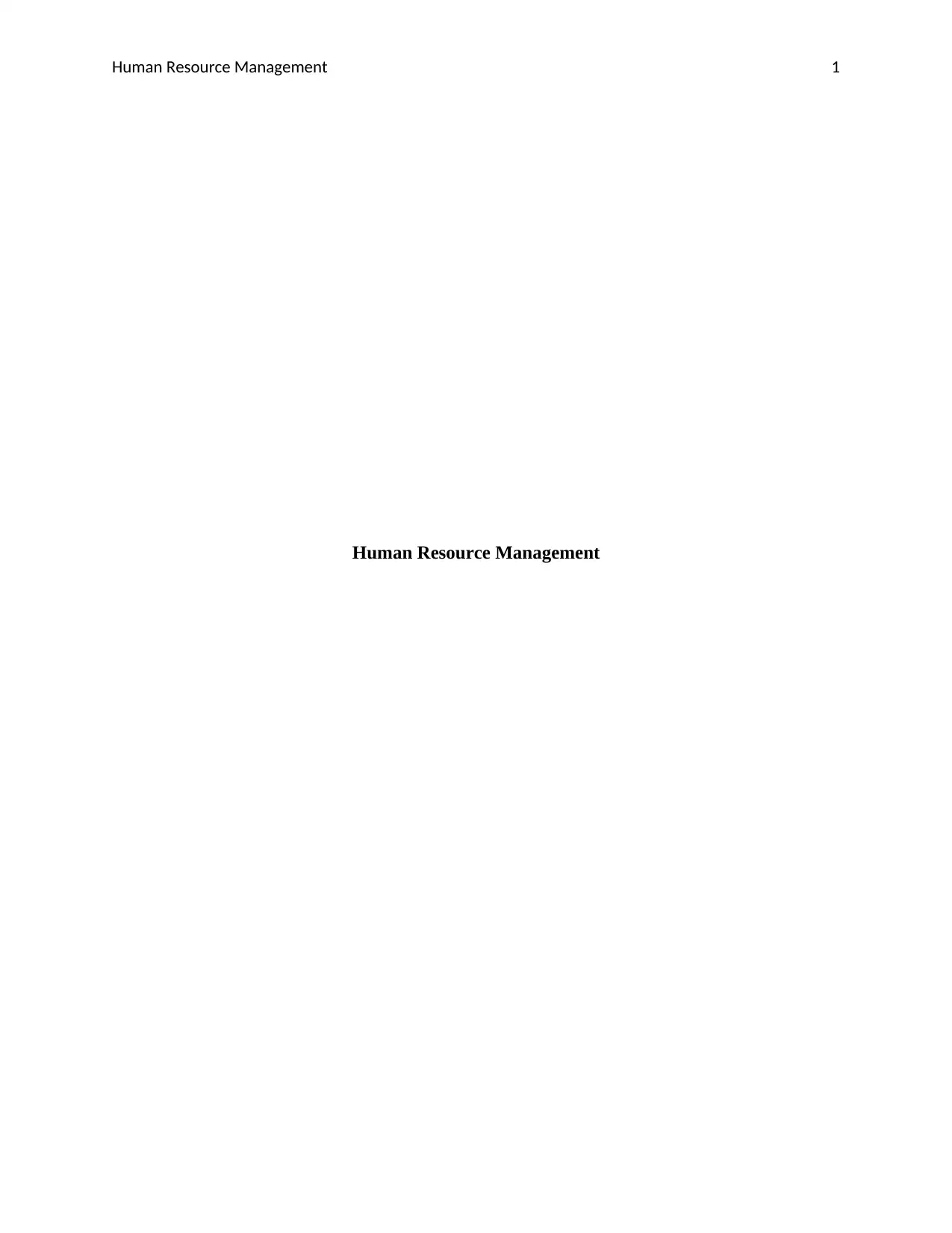
Human Resource Management 1
Human Resource Management
Human Resource Management
Paraphrase This Document
Need a fresh take? Get an instant paraphrase of this document with our AI Paraphraser
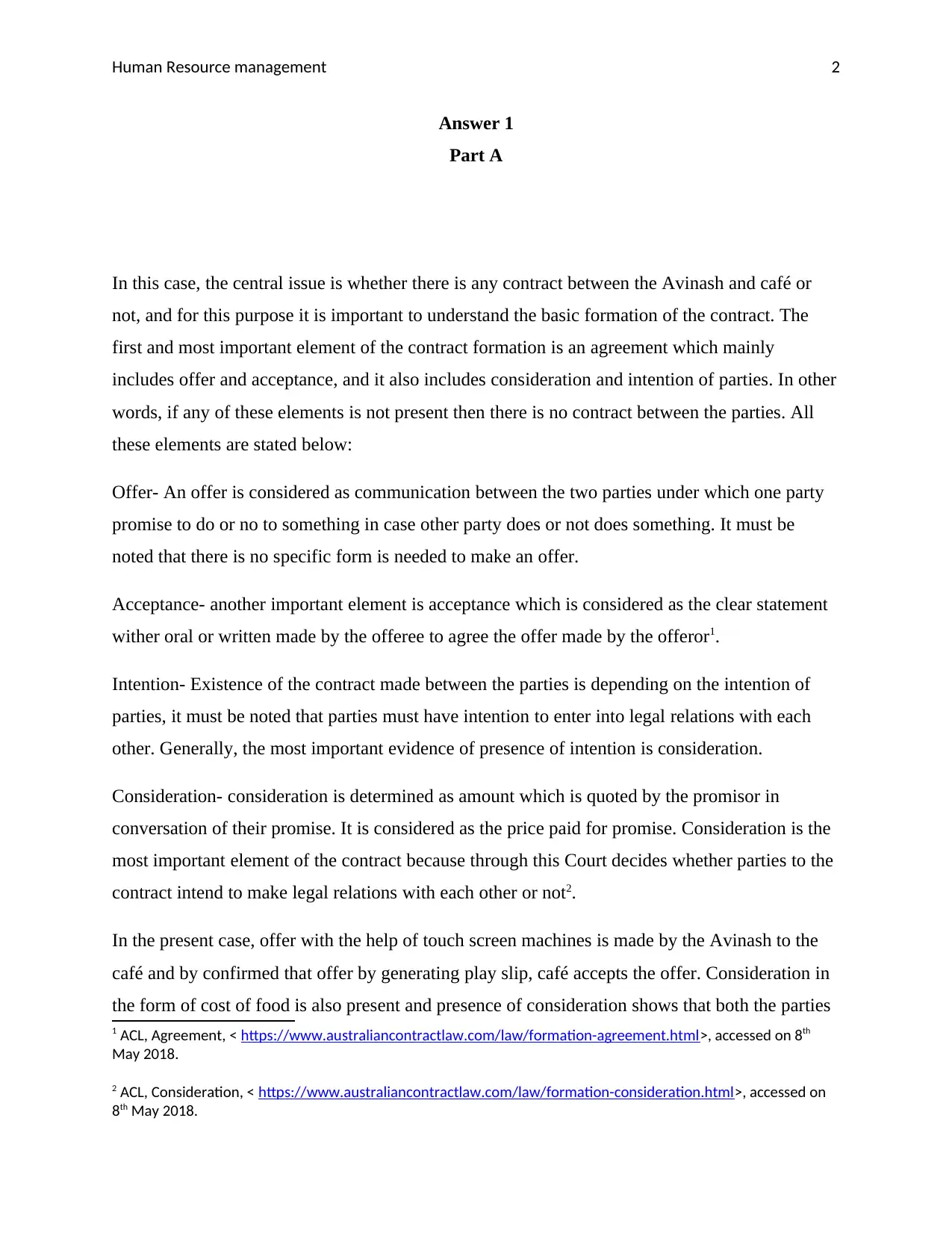
Human Resource management 2
Answer 1
Part A
In this case, the central issue is whether there is any contract between the Avinash and café or
not, and for this purpose it is important to understand the basic formation of the contract. The
first and most important element of the contract formation is an agreement which mainly
includes offer and acceptance, and it also includes consideration and intention of parties. In other
words, if any of these elements is not present then there is no contract between the parties. All
these elements are stated below:
Offer- An offer is considered as communication between the two parties under which one party
promise to do or no to something in case other party does or not does something. It must be
noted that there is no specific form is needed to make an offer.
Acceptance- another important element is acceptance which is considered as the clear statement
wither oral or written made by the offeree to agree the offer made by the offeror1.
Intention- Existence of the contract made between the parties is depending on the intention of
parties, it must be noted that parties must have intention to enter into legal relations with each
other. Generally, the most important evidence of presence of intention is consideration.
Consideration- consideration is determined as amount which is quoted by the promisor in
conversation of their promise. It is considered as the price paid for promise. Consideration is the
most important element of the contract because through this Court decides whether parties to the
contract intend to make legal relations with each other or not2.
In the present case, offer with the help of touch screen machines is made by the Avinash to the
café and by confirmed that offer by generating play slip, café accepts the offer. Consideration in
the form of cost of food is also present and presence of consideration shows that both the parties
1 ACL, Agreement, < https://www.australiancontractlaw.com/law/formation-agreement.html>, accessed on 8th
May 2018.
2 ACL, Consideration, < https://www.australiancontractlaw.com/law/formation-consideration.html>, accessed on
8th May 2018.
Answer 1
Part A
In this case, the central issue is whether there is any contract between the Avinash and café or
not, and for this purpose it is important to understand the basic formation of the contract. The
first and most important element of the contract formation is an agreement which mainly
includes offer and acceptance, and it also includes consideration and intention of parties. In other
words, if any of these elements is not present then there is no contract between the parties. All
these elements are stated below:
Offer- An offer is considered as communication between the two parties under which one party
promise to do or no to something in case other party does or not does something. It must be
noted that there is no specific form is needed to make an offer.
Acceptance- another important element is acceptance which is considered as the clear statement
wither oral or written made by the offeree to agree the offer made by the offeror1.
Intention- Existence of the contract made between the parties is depending on the intention of
parties, it must be noted that parties must have intention to enter into legal relations with each
other. Generally, the most important evidence of presence of intention is consideration.
Consideration- consideration is determined as amount which is quoted by the promisor in
conversation of their promise. It is considered as the price paid for promise. Consideration is the
most important element of the contract because through this Court decides whether parties to the
contract intend to make legal relations with each other or not2.
In the present case, offer with the help of touch screen machines is made by the Avinash to the
café and by confirmed that offer by generating play slip, café accepts the offer. Consideration in
the form of cost of food is also present and presence of consideration shows that both the parties
1 ACL, Agreement, < https://www.australiancontractlaw.com/law/formation-agreement.html>, accessed on 8th
May 2018.
2 ACL, Consideration, < https://www.australiancontractlaw.com/law/formation-consideration.html>, accessed on
8th May 2018.
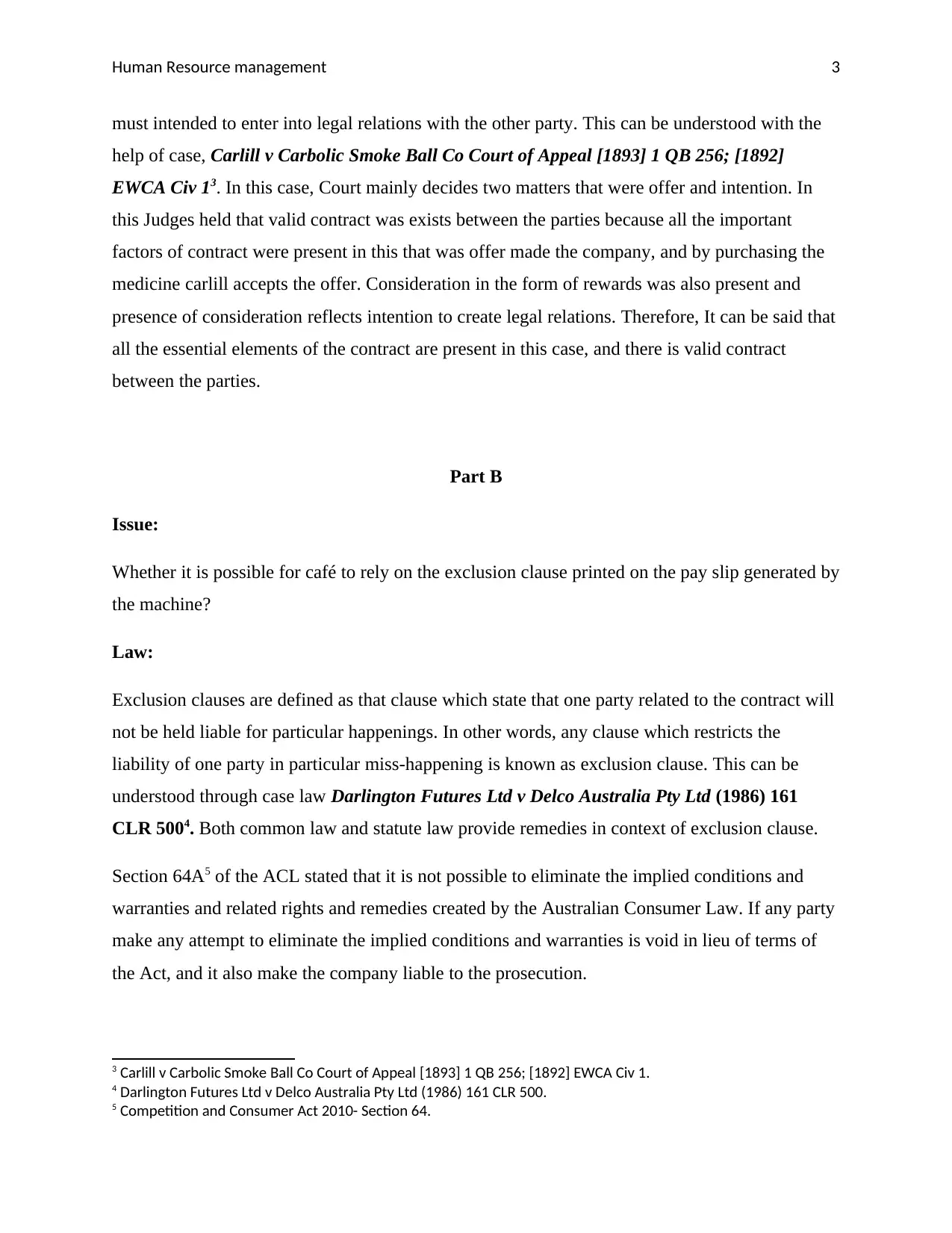
Human Resource management 3
must intended to enter into legal relations with the other party. This can be understood with the
help of case, Carlill v Carbolic Smoke Ball Co Court of Appeal [1893] 1 QB 256; [1892]
EWCA Civ 13. In this case, Court mainly decides two matters that were offer and intention. In
this Judges held that valid contract was exists between the parties because all the important
factors of contract were present in this that was offer made the company, and by purchasing the
medicine carlill accepts the offer. Consideration in the form of rewards was also present and
presence of consideration reflects intention to create legal relations. Therefore, It can be said that
all the essential elements of the contract are present in this case, and there is valid contract
between the parties.
Part B
Issue:
Whether it is possible for café to rely on the exclusion clause printed on the pay slip generated by
the machine?
Law:
Exclusion clauses are defined as that clause which state that one party related to the contract will
not be held liable for particular happenings. In other words, any clause which restricts the
liability of one party in particular miss-happening is known as exclusion clause. This can be
understood through case law Darlington Futures Ltd v Delco Australia Pty Ltd (1986) 161
CLR 5004. Both common law and statute law provide remedies in context of exclusion clause.
Section 64A5 of the ACL stated that it is not possible to eliminate the implied conditions and
warranties and related rights and remedies created by the Australian Consumer Law. If any party
make any attempt to eliminate the implied conditions and warranties is void in lieu of terms of
the Act, and it also make the company liable to the prosecution.
3 Carlill v Carbolic Smoke Ball Co Court of Appeal [1893] 1 QB 256; [1892] EWCA Civ 1.
4 Darlington Futures Ltd v Delco Australia Pty Ltd (1986) 161 CLR 500.
5 Competition and Consumer Act 2010- Section 64.
must intended to enter into legal relations with the other party. This can be understood with the
help of case, Carlill v Carbolic Smoke Ball Co Court of Appeal [1893] 1 QB 256; [1892]
EWCA Civ 13. In this case, Court mainly decides two matters that were offer and intention. In
this Judges held that valid contract was exists between the parties because all the important
factors of contract were present in this that was offer made the company, and by purchasing the
medicine carlill accepts the offer. Consideration in the form of rewards was also present and
presence of consideration reflects intention to create legal relations. Therefore, It can be said that
all the essential elements of the contract are present in this case, and there is valid contract
between the parties.
Part B
Issue:
Whether it is possible for café to rely on the exclusion clause printed on the pay slip generated by
the machine?
Law:
Exclusion clauses are defined as that clause which state that one party related to the contract will
not be held liable for particular happenings. In other words, any clause which restricts the
liability of one party in particular miss-happening is known as exclusion clause. This can be
understood through case law Darlington Futures Ltd v Delco Australia Pty Ltd (1986) 161
CLR 5004. Both common law and statute law provide remedies in context of exclusion clause.
Section 64A5 of the ACL stated that it is not possible to eliminate the implied conditions and
warranties and related rights and remedies created by the Australian Consumer Law. If any party
make any attempt to eliminate the implied conditions and warranties is void in lieu of terms of
the Act, and it also make the company liable to the prosecution.
3 Carlill v Carbolic Smoke Ball Co Court of Appeal [1893] 1 QB 256; [1892] EWCA Civ 1.
4 Darlington Futures Ltd v Delco Australia Pty Ltd (1986) 161 CLR 500.
5 Competition and Consumer Act 2010- Section 64.
⊘ This is a preview!⊘
Do you want full access?
Subscribe today to unlock all pages.

Trusted by 1+ million students worldwide
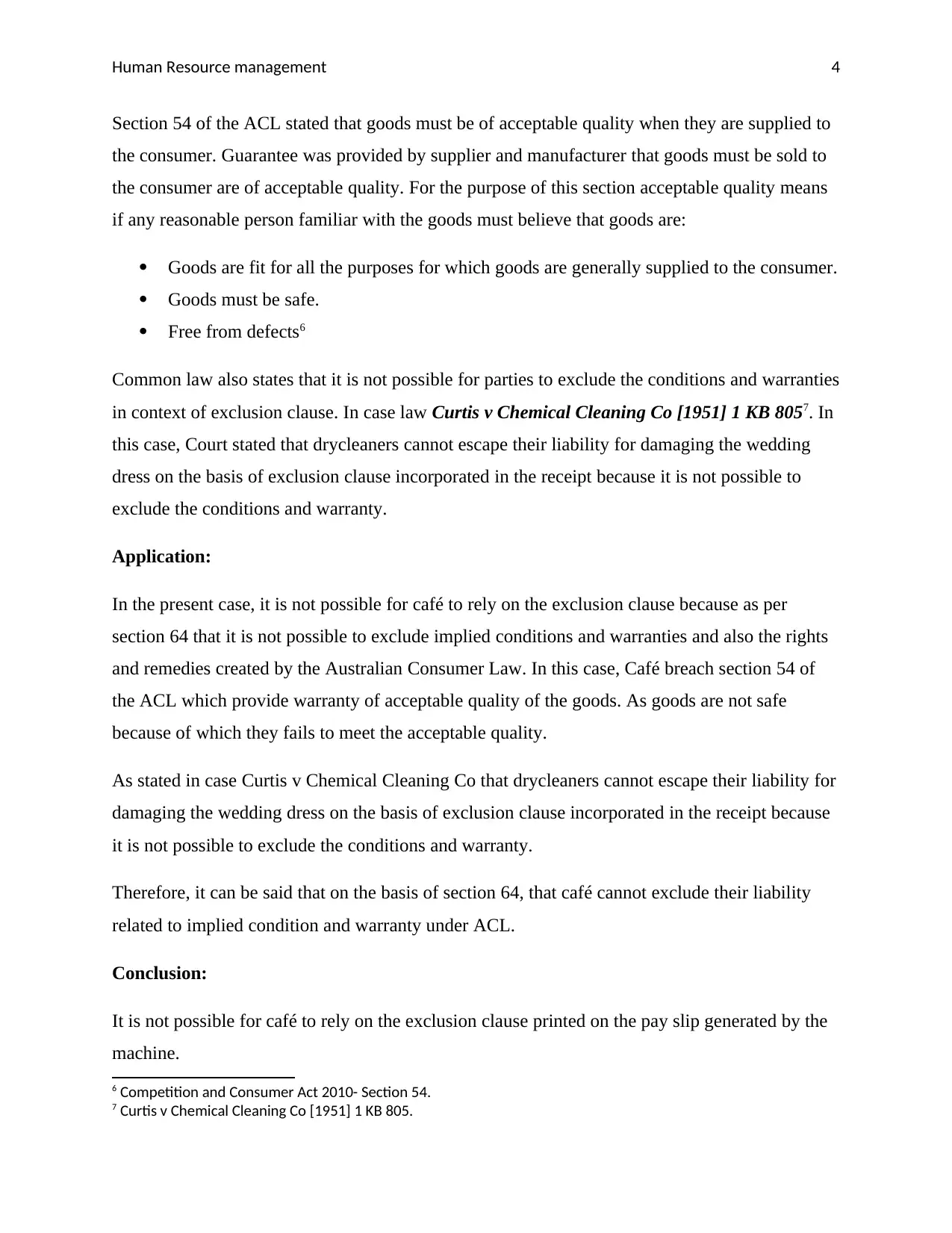
Human Resource management 4
Section 54 of the ACL stated that goods must be of acceptable quality when they are supplied to
the consumer. Guarantee was provided by supplier and manufacturer that goods must be sold to
the consumer are of acceptable quality. For the purpose of this section acceptable quality means
if any reasonable person familiar with the goods must believe that goods are:
Goods are fit for all the purposes for which goods are generally supplied to the consumer.
Goods must be safe.
Free from defects6
Common law also states that it is not possible for parties to exclude the conditions and warranties
in context of exclusion clause. In case law Curtis v Chemical Cleaning Co [1951] 1 KB 8057. In
this case, Court stated that drycleaners cannot escape their liability for damaging the wedding
dress on the basis of exclusion clause incorporated in the receipt because it is not possible to
exclude the conditions and warranty.
Application:
In the present case, it is not possible for café to rely on the exclusion clause because as per
section 64 that it is not possible to exclude implied conditions and warranties and also the rights
and remedies created by the Australian Consumer Law. In this case, Café breach section 54 of
the ACL which provide warranty of acceptable quality of the goods. As goods are not safe
because of which they fails to meet the acceptable quality.
As stated in case Curtis v Chemical Cleaning Co that drycleaners cannot escape their liability for
damaging the wedding dress on the basis of exclusion clause incorporated in the receipt because
it is not possible to exclude the conditions and warranty.
Therefore, it can be said that on the basis of section 64, that café cannot exclude their liability
related to implied condition and warranty under ACL.
Conclusion:
It is not possible for café to rely on the exclusion clause printed on the pay slip generated by the
machine.
6 Competition and Consumer Act 2010- Section 54.
7 Curtis v Chemical Cleaning Co [1951] 1 KB 805.
Section 54 of the ACL stated that goods must be of acceptable quality when they are supplied to
the consumer. Guarantee was provided by supplier and manufacturer that goods must be sold to
the consumer are of acceptable quality. For the purpose of this section acceptable quality means
if any reasonable person familiar with the goods must believe that goods are:
Goods are fit for all the purposes for which goods are generally supplied to the consumer.
Goods must be safe.
Free from defects6
Common law also states that it is not possible for parties to exclude the conditions and warranties
in context of exclusion clause. In case law Curtis v Chemical Cleaning Co [1951] 1 KB 8057. In
this case, Court stated that drycleaners cannot escape their liability for damaging the wedding
dress on the basis of exclusion clause incorporated in the receipt because it is not possible to
exclude the conditions and warranty.
Application:
In the present case, it is not possible for café to rely on the exclusion clause because as per
section 64 that it is not possible to exclude implied conditions and warranties and also the rights
and remedies created by the Australian Consumer Law. In this case, Café breach section 54 of
the ACL which provide warranty of acceptable quality of the goods. As goods are not safe
because of which they fails to meet the acceptable quality.
As stated in case Curtis v Chemical Cleaning Co that drycleaners cannot escape their liability for
damaging the wedding dress on the basis of exclusion clause incorporated in the receipt because
it is not possible to exclude the conditions and warranty.
Therefore, it can be said that on the basis of section 64, that café cannot exclude their liability
related to implied condition and warranty under ACL.
Conclusion:
It is not possible for café to rely on the exclusion clause printed on the pay slip generated by the
machine.
6 Competition and Consumer Act 2010- Section 54.
7 Curtis v Chemical Cleaning Co [1951] 1 KB 805.
Paraphrase This Document
Need a fresh take? Get an instant paraphrase of this document with our AI Paraphraser
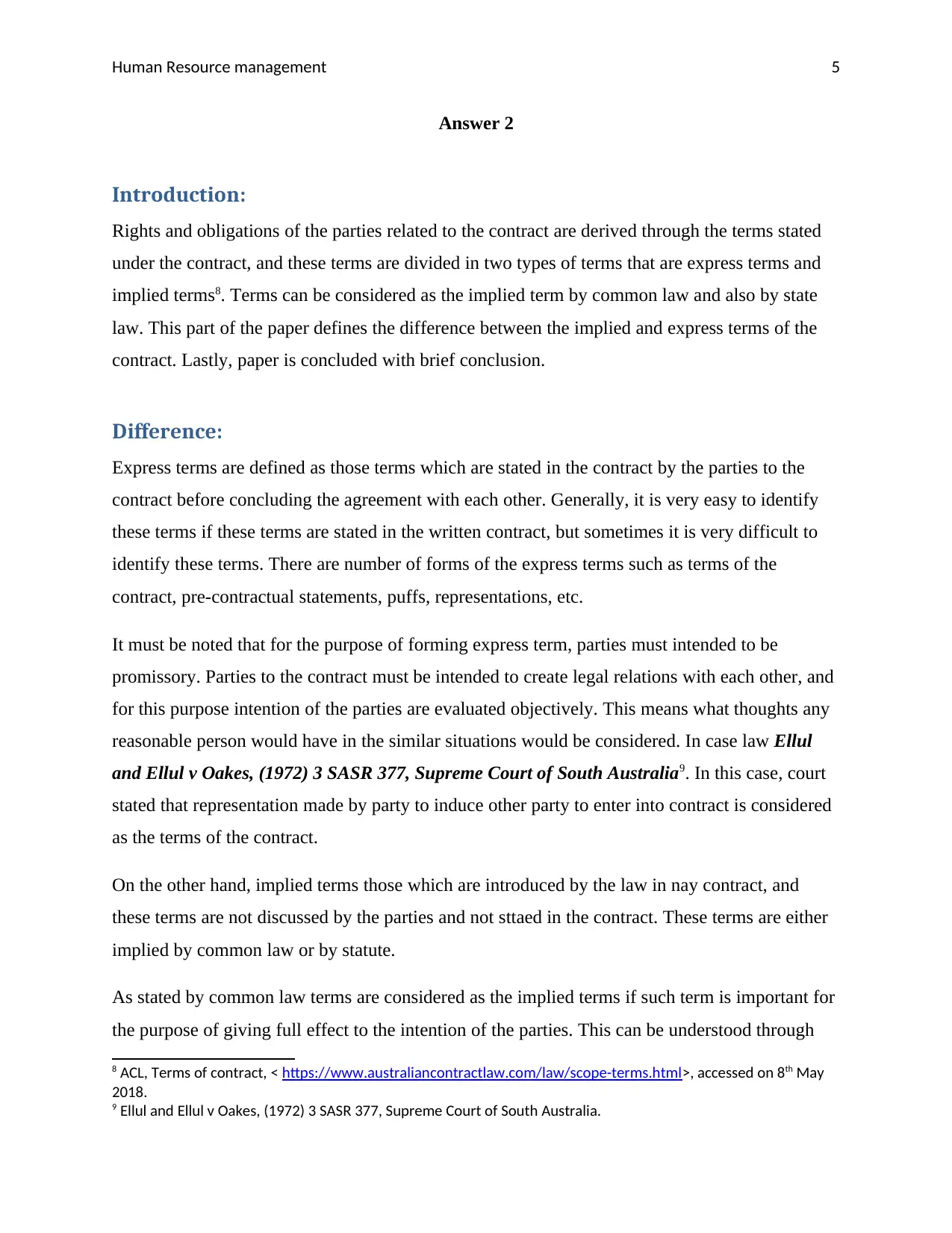
Human Resource management 5
Answer 2
Introduction:
Rights and obligations of the parties related to the contract are derived through the terms stated
under the contract, and these terms are divided in two types of terms that are express terms and
implied terms8. Terms can be considered as the implied term by common law and also by state
law. This part of the paper defines the difference between the implied and express terms of the
contract. Lastly, paper is concluded with brief conclusion.
Difference:
Express terms are defined as those terms which are stated in the contract by the parties to the
contract before concluding the agreement with each other. Generally, it is very easy to identify
these terms if these terms are stated in the written contract, but sometimes it is very difficult to
identify these terms. There are number of forms of the express terms such as terms of the
contract, pre-contractual statements, puffs, representations, etc.
It must be noted that for the purpose of forming express term, parties must intended to be
promissory. Parties to the contract must be intended to create legal relations with each other, and
for this purpose intention of the parties are evaluated objectively. This means what thoughts any
reasonable person would have in the similar situations would be considered. In case law Ellul
and Ellul v Oakes, (1972) 3 SASR 377, Supreme Court of South Australia9. In this case, court
stated that representation made by party to induce other party to enter into contract is considered
as the terms of the contract.
On the other hand, implied terms those which are introduced by the law in nay contract, and
these terms are not discussed by the parties and not sttaed in the contract. These terms are either
implied by common law or by statute.
As stated by common law terms are considered as the implied terms if such term is important for
the purpose of giving full effect to the intention of the parties. This can be understood through
8 ACL, Terms of contract, < https://www.australiancontractlaw.com/law/scope-terms.html>, accessed on 8th May
2018.
9 Ellul and Ellul v Oakes, (1972) 3 SASR 377, Supreme Court of South Australia.
Answer 2
Introduction:
Rights and obligations of the parties related to the contract are derived through the terms stated
under the contract, and these terms are divided in two types of terms that are express terms and
implied terms8. Terms can be considered as the implied term by common law and also by state
law. This part of the paper defines the difference between the implied and express terms of the
contract. Lastly, paper is concluded with brief conclusion.
Difference:
Express terms are defined as those terms which are stated in the contract by the parties to the
contract before concluding the agreement with each other. Generally, it is very easy to identify
these terms if these terms are stated in the written contract, but sometimes it is very difficult to
identify these terms. There are number of forms of the express terms such as terms of the
contract, pre-contractual statements, puffs, representations, etc.
It must be noted that for the purpose of forming express term, parties must intended to be
promissory. Parties to the contract must be intended to create legal relations with each other, and
for this purpose intention of the parties are evaluated objectively. This means what thoughts any
reasonable person would have in the similar situations would be considered. In case law Ellul
and Ellul v Oakes, (1972) 3 SASR 377, Supreme Court of South Australia9. In this case, court
stated that representation made by party to induce other party to enter into contract is considered
as the terms of the contract.
On the other hand, implied terms those which are introduced by the law in nay contract, and
these terms are not discussed by the parties and not sttaed in the contract. These terms are either
implied by common law or by statute.
As stated by common law terms are considered as the implied terms if such term is important for
the purpose of giving full effect to the intention of the parties. This can be understood through
8 ACL, Terms of contract, < https://www.australiancontractlaw.com/law/scope-terms.html>, accessed on 8th May
2018.
9 Ellul and Ellul v Oakes, (1972) 3 SASR 377, Supreme Court of South Australia.
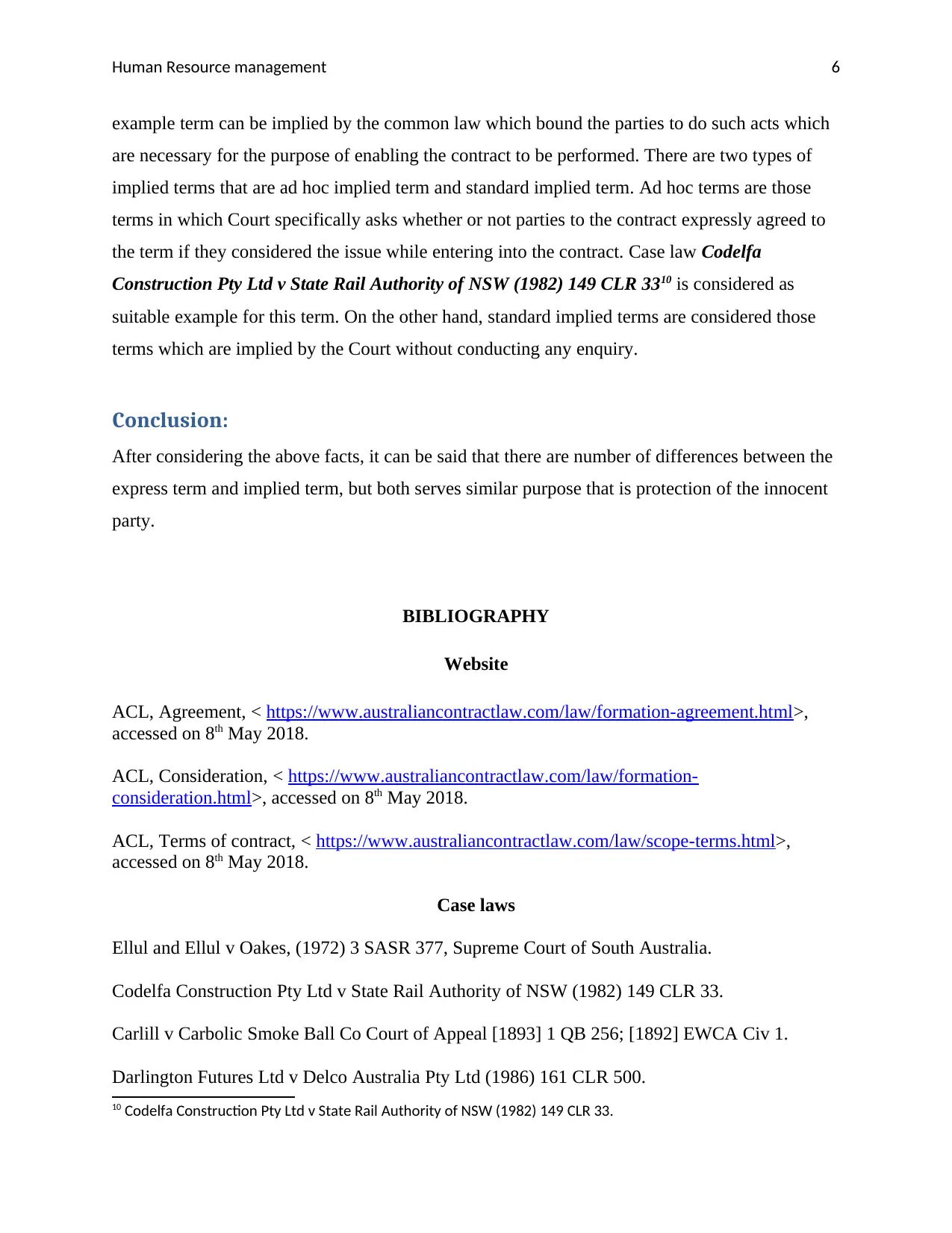
Human Resource management 6
example term can be implied by the common law which bound the parties to do such acts which
are necessary for the purpose of enabling the contract to be performed. There are two types of
implied terms that are ad hoc implied term and standard implied term. Ad hoc terms are those
terms in which Court specifically asks whether or not parties to the contract expressly agreed to
the term if they considered the issue while entering into the contract. Case law Codelfa
Construction Pty Ltd v State Rail Authority of NSW (1982) 149 CLR 3310 is considered as
suitable example for this term. On the other hand, standard implied terms are considered those
terms which are implied by the Court without conducting any enquiry.
Conclusion:
After considering the above facts, it can be said that there are number of differences between the
express term and implied term, but both serves similar purpose that is protection of the innocent
party.
BIBLIOGRAPHY
Website
ACL, Agreement, < https://www.australiancontractlaw.com/law/formation-agreement.html>,
accessed on 8th May 2018.
ACL, Consideration, < https://www.australiancontractlaw.com/law/formation-
consideration.html>, accessed on 8th May 2018.
ACL, Terms of contract, < https://www.australiancontractlaw.com/law/scope-terms.html>,
accessed on 8th May 2018.
Case laws
Ellul and Ellul v Oakes, (1972) 3 SASR 377, Supreme Court of South Australia.
Codelfa Construction Pty Ltd v State Rail Authority of NSW (1982) 149 CLR 33.
Carlill v Carbolic Smoke Ball Co Court of Appeal [1893] 1 QB 256; [1892] EWCA Civ 1.
Darlington Futures Ltd v Delco Australia Pty Ltd (1986) 161 CLR 500.
10 Codelfa Construction Pty Ltd v State Rail Authority of NSW (1982) 149 CLR 33.
example term can be implied by the common law which bound the parties to do such acts which
are necessary for the purpose of enabling the contract to be performed. There are two types of
implied terms that are ad hoc implied term and standard implied term. Ad hoc terms are those
terms in which Court specifically asks whether or not parties to the contract expressly agreed to
the term if they considered the issue while entering into the contract. Case law Codelfa
Construction Pty Ltd v State Rail Authority of NSW (1982) 149 CLR 3310 is considered as
suitable example for this term. On the other hand, standard implied terms are considered those
terms which are implied by the Court without conducting any enquiry.
Conclusion:
After considering the above facts, it can be said that there are number of differences between the
express term and implied term, but both serves similar purpose that is protection of the innocent
party.
BIBLIOGRAPHY
Website
ACL, Agreement, < https://www.australiancontractlaw.com/law/formation-agreement.html>,
accessed on 8th May 2018.
ACL, Consideration, < https://www.australiancontractlaw.com/law/formation-
consideration.html>, accessed on 8th May 2018.
ACL, Terms of contract, < https://www.australiancontractlaw.com/law/scope-terms.html>,
accessed on 8th May 2018.
Case laws
Ellul and Ellul v Oakes, (1972) 3 SASR 377, Supreme Court of South Australia.
Codelfa Construction Pty Ltd v State Rail Authority of NSW (1982) 149 CLR 33.
Carlill v Carbolic Smoke Ball Co Court of Appeal [1893] 1 QB 256; [1892] EWCA Civ 1.
Darlington Futures Ltd v Delco Australia Pty Ltd (1986) 161 CLR 500.
10 Codelfa Construction Pty Ltd v State Rail Authority of NSW (1982) 149 CLR 33.
⊘ This is a preview!⊘
Do you want full access?
Subscribe today to unlock all pages.

Trusted by 1+ million students worldwide
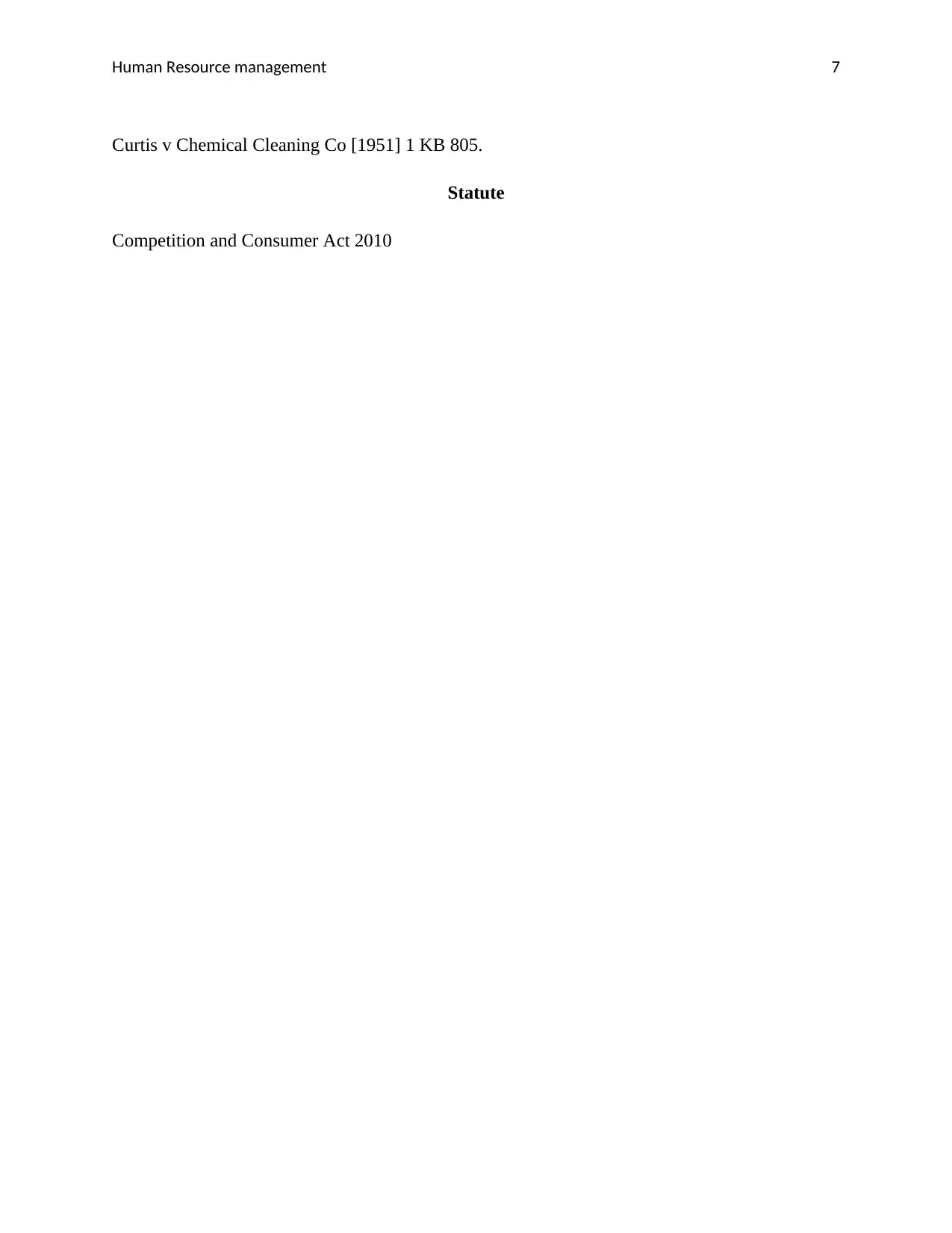
Human Resource management 7
Curtis v Chemical Cleaning Co [1951] 1 KB 805.
Statute
Competition and Consumer Act 2010
Curtis v Chemical Cleaning Co [1951] 1 KB 805.
Statute
Competition and Consumer Act 2010
1 out of 7
Related Documents
Your All-in-One AI-Powered Toolkit for Academic Success.
+13062052269
info@desklib.com
Available 24*7 on WhatsApp / Email
![[object Object]](/_next/static/media/star-bottom.7253800d.svg)
Unlock your academic potential
Copyright © 2020–2026 A2Z Services. All Rights Reserved. Developed and managed by ZUCOL.





